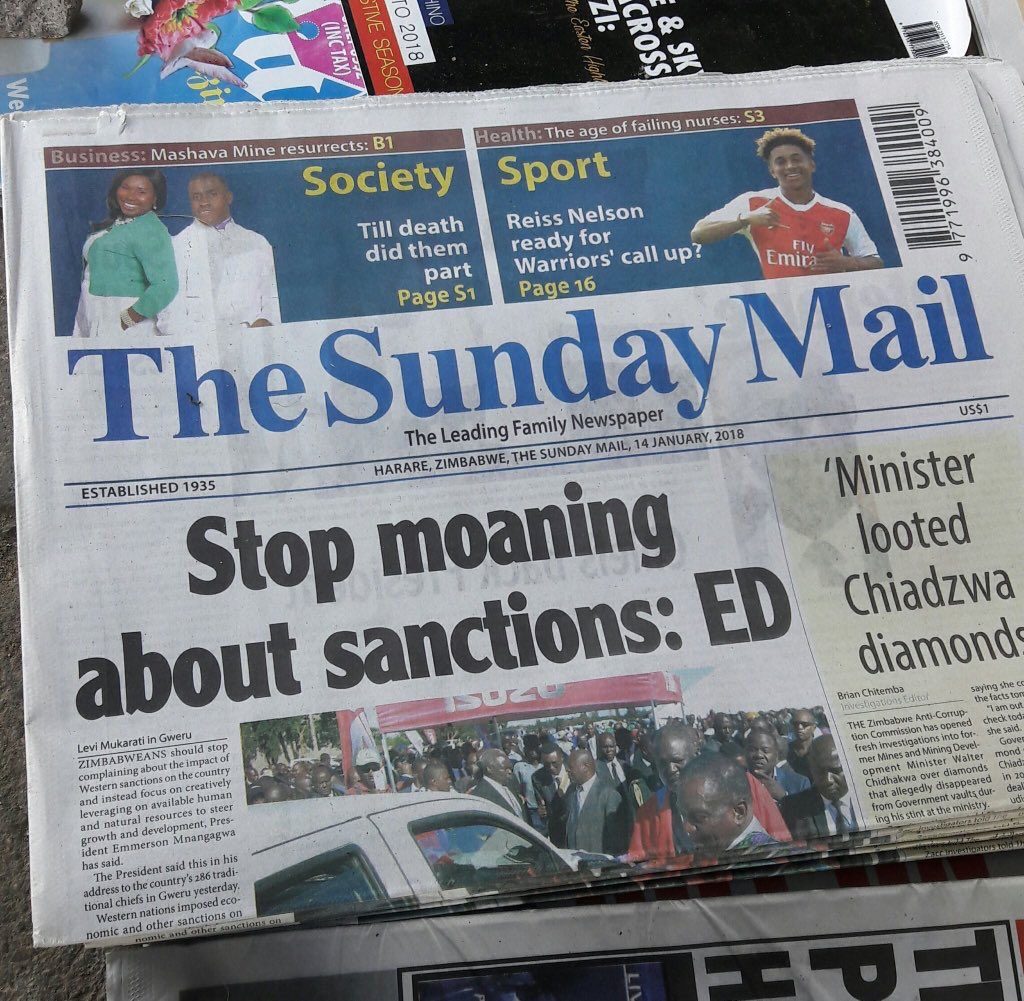
State Media 14 January 2018|Zimbabweans should stop complaining about the impact of Western sanctions on the country and instead focus on creatively leveraging on available human and natural resources to steer growth and development, President Emmerson Mnangagwa has said.
The President said this in his address to the country’s 286 traditional chiefs in Gweru yesterday.
Western nations imposed economic and other sanctions on Zimbabwe at the turn of the millennium after Harare embarked on the Fast-Track Land Reform Programme that resulted in tens of thousands of indigenes being allocated farms previously held by around 6 000 white farmers.
Yesterday, President Mnangagwa said the embargo had negatively impacted on development, but it was time the nation stopped whining about this reality and instead turned its attentions to factors that it had control over.
“Takaita masanctions edu atidzorera shure, asi ikozvino hatichafaniri kuramba tichichema namasanctions. Nezvatinazvo, tikabatana tinosimuka. Nyika yedu inosimuka. Matoona kuti tava nesolution in the area of agriculture and the area of food security. Tava nesolution nemasolutions in manufacturing.”
While still Vice-President, President Mnangagwa – as a developmental intervention –spearheaded formulation and implementation of the Command Agriculture Programme that has seen output of the staple maize improve.
That approach is now being applied to diverse other sectors and subsectors as a homegrown solution to growth and development challenges.
Speaking to the chiefs in Gweru yesterday, President Mnangagwa said: “We must also have a solution in the area of beneficiation and value addition. We must have solutions in the area of the types of skills that must be taught in our institutions.
“Recently, I had a meeting with the vice-chancellors (of universities) and the heads of institutions and we all agreed that the teaching, the content of teaching in our institutions, should talk to what we must do, what industry needs, what the farmer needs, what the communities need to grow and develop.
“We cannot just have institutions which are academic and just continue being academic without addressing and looking at what the needs of society are.
“So, whatever we are doing and we agreed with the minister responsible for higher education that our curriculum should now be structured so as to talk to the needs of society. So, across the board, that’s what we must now endeavour to achieve.”
In his address, the President started by formally informing chiefs — who are custodians of the nation’s values and culture — of his ascendency to the helm; something the traditional leaders heartily welcomed.
President Mnangagwa said he would be formally introducing himself to key stakeholders locally and in the region in coming weeks.
The Head of State and Government and Commander-in-Chief of the Zimbabwe Defence Forces said he was using such engagements to also explain his vision for the nation.
President Mnangagwa said an indaba between the Chiefs Council and line ministers was on the cards to enable Government to address issues affecting traditional leaders.
He also said as Zimbabwe geared for elections, it was important for dialogue to occur wherever divergent opinions emerged.
“So, message yatinayo ndeye unity, unity, peace, peace, love, love, non-violence. Patinoenda kusarudzo, hatidi kunzwa violence, vanhu batanayi. Nyango mukapesana nezvematongerwo enyika, mumwe akaita rimwe bato raanofunga kuti rinomubatsira, hazvifanirwe kuti nekuti munhu adaro, murwisane. Kwete.
“Indangariro dzake. Bato rimwe nerimwe rinenge richitaura kuti kudayi tikatonga, richaita zvakati asi hakuna bato rinemazano angapfuure edu. Takabva kuhondo tichirwira kuti nyika isununguke. Hakunazve rimwe bato rakarwira kuti nyika isununguke. Saka tiine shungu nehudzamu hwekuda nyika.
“Vazhinji vaneshuviro rekuti tishande takabatana. Only when the country is peaceful can we develop, can we ensure our own children can be supported to go to school, to go to universities, to go abroad and bring back the skills needed for development in the country.”



